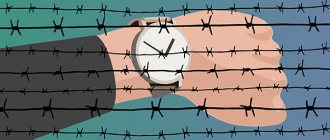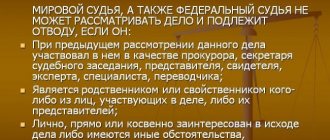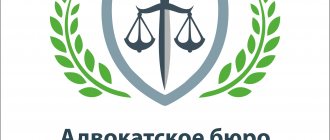Quick navigation
- Features of appealing a sentence in a criminal case
- Time limits for appealing a verdict to the Supreme Court
- Appeal to the Supreme Court
- Types and requirements for complaints to the Supreme Court
- Assistance from a lawyer on appealing verdicts in the Supreme Court
- Leading lawyers
A court verdict passed on the basis of consideration of criminal cases is a judicial act expressed in the form of a corresponding decision of an authorized judicial body regarding the guilt or innocence of a specific person recognized as a defendant in a case for committing a crime. The final verdict is the logical conclusion of the process of considering the criminal case on its merits. Thus, the decision of the judicial authority may consist in imposing a certain punishment on the defendant or in releasing him from criminal liability, subject to the provision of sufficient evidence indicating the innocence of the person.
Citizens of the Russian Federation must remember that all judicial verdicts are made on behalf of the state, as a result of which they are endowed with its own force and are subject to mandatory execution. The court takes full responsibility for the fairness of the final decision and its compliance with the requirements, norms and provisions of the current legislation of the country. When making a decision, authorized officials rely on their own internal beliefs and moral principles.
Unfortunately, the judicial system is not perfect, and in legal practice there are often cases when participants in a criminal case demonstrate disagreement with the fairness of the final court decision. Given this possibility, the legislation of the Russian Federation provides for the possibility of appealing against a verdict that seems insufficiently fair to the participants in the proceedings. If you contact a qualified lawyer in a timely manner, you can avoid the need for an appeal, since an experienced lawyer will do everything possible to prevent the initiation of a criminal case and its subsequent transfer to court. However, if a court decision has already been made, and you do not intend to put up with its essence, an appeal to the Supreme Court of the Russian Federation becomes the most effective action, especially if you enlist the support of a competent specialist.
Features of appealing a sentence in a criminal case
Challenging a court verdict in a criminal case before it comes into force is one of the most significant stages of legal proceedings aimed at realizing the rights of each party to review a court decision in higher judicial bodies in compliance with the procedure and conditions provided for by the federal laws of the Russian Federation. According to the current legislation of the country, absolutely every sentence that has not entered into legal force can be challenged at the request of the participants in the proceedings. Upon receipt of a complaint from participants in a criminal case, a higher judicial body, in this case the Supreme Court, undertakes to carry out an in-depth examination of the fairness and validity of the court decision, taking into account the circumstances and arguments given in the complaint.
The exercise of the right to challenge court decisions directly depends on the position of persons vested with this right in accordance with the laws of the country. As for the list of participants in a criminal case who have the right to challenge a court decision before it enters into legal force, it includes the convicted person (or acquitted), as well as his legal representative in the person of a defense lawyer. The prosecution - the prosecutor, the victim, the victim's lawyer - is also given the right to challenge. Challenging court decisions by civil plaintiffs and defendants or their legal representatives is possible only within the framework of civil claims.
Today, criminal proceedings provide for several ways to challenge court decisions. The actual procedure for challenging a judicial verdict in a criminal case is determined taking into account the characteristics of the judicial body that issued the verdict in question. The highest judicial authority on the territory of the Russian Federation is the Supreme Court. This body is a judicial institution of state importance, vested with special powers to resolve disputes related to criminal, civil, administrative and other categories of law that were adopted by courts of general jurisdiction. The Supreme Court is also competent to carry out supervisory functions in relation to the activities of lower judicial bodies, in-depth research and analysis of actual judicial practice, and provide detailed explanations regarding relevant issues.
From the point of view of current legislation, the Supreme Court plays the role of last resort. Nevertheless, there are some types of criminal cases in which the proceedings only begin with an appeal to the Armed Forces of the Russian Federation. For example, criminal proceedings fall within the powers of the Supreme Court if the case is particularly complex. The decisions made by the Supreme Judicial Body are final and do not provide for subsequent challenge on the territory of the Russian Federation. A court decision rendered by a given state judicial body in a jury trial is subject to challenge in the Supreme Court only on the grounds of contradiction to criminal procedural rules or injustice.
Who can appeal a court verdict?
An appeal against a verdict can be filed by:
- the convicted person (acquitted), his defense attorney and legal representative;
- state prosecutor and (or) superior prosecutor;
- victim (private prosecutor) their legal representatives and representatives
- other persons to the extent that the appealed court decision affects their rights and legitimate interests.
The right to appeal a verdict or court decision regarding a civil claim also belongs to:
- to the civil plaintiff, his legal representative;
- to the civil defendant, his legal representative.
Time limits for appealing a verdict to the Supreme Court
The current legislation of the Russian Federation establishes the following deadlines for challenging court decisions:
- For filing an appeal, a period of 10 days is provided from the moment the verdict or other court decision was issued, which provides for the possibility of appeal. If the convicted person is in custody, the countdown of this period begins from the day on which the person received the decision in question.
- For challenging a court decision by way of cassation or supervision, no exact deadline is established. The exception in this case is situations in which a review of a sentence or court decision is carried out by way of cassation or supervision, the grounds of which entailed aggravation of the situation of the convicted or acquitted person. In such conditions, the period for challenging is equal to one year from the moment the court decision enters into legal force if errors and inaccuracies were made during the proceedings, resulting in a violation of legislative norms and the concept of fairness of the verdict.
If the deadline for a dispute expires on weekends or holidays, it is recalculated and the last working day becomes the next working day.
If a complaint is filed with violation of certain details, the Court will grant an additional period to eliminate the identified violations. If there is no repeated complaint with corrected violations within a predetermined period or repeated violations, the proceedings are terminated and the complaint is not considered filed. Filing a complaint after the expiration of the established time period also entails refusal to accept the application for consideration. At the same time, the legislation of the Russian Federation provides for exceptions, within the framework of which the presence of valid reasons is the basis for a request to restore the missed period of appeal. In order to restore the missed deadline, the applicant must provide documents that confirm the right to do so. Such documents may be medical certificates and extracts, death certificates of close relatives, and so on. If the petition for restoration of the missed deadline is granted, then the complaint is considered filed on time.
An unappealed court decision comes into force after the expiration of the 10-day period. If the applicant has filed an appeal, the entry into force occurs after the final decision on the appeal is made.
Grounds for reviewing a court decision
To schedule a new trial of an already closed case, you can use two reasons: to find new or newly discovered circumstances in the case. The difference in these two concepts is visible when considering the list of each item.
Newly discovered circumstances include:
- Circumstances that were not known to the applicant at the time of the trial, but already existed at that time.
- False witness statements and expert reports, as well as other falsifications that influenced the judge's decision;
- A crime committed by any of the participants in the process that influenced the resolution of the dispute.
New circumstances include:
- Cancellation of a court decision, which was considered in the process as evidence of the position of any of the participants;
- Recognition of the transaction on which the winner's strategy was based as illegal in court;
- Declaration of the law that was used to resolve the case as unconstitutional.
The main difference is that new circumstances appear after the decision is made, and newly discovered ones existed, but they became known much later, so they could not be applied in judicial proceedings in any of the instances.
Appeal to the Supreme Court
Many citizens of the Russian Federation consider the Supreme Judicial Body to be an absolutely inaccessible authority for the average person. In fact, recourse to the help of the Supreme Court of the Russian Federation is available to everyone who needs fair protection. The only condition in this case is compliance with the regulations established by the legislation of the country, including the sequence of stages of production, the procedure for filing a complaint, and so on. An appeal to the Supreme Judicial Authority is recommended when passing through all lower courts without receiving an answer or decision satisfactory to the applicant.
Compliance with established rules and requirements is the key to significantly increasing the chances of a favorable outcome when considering a complaint in the Supreme Court of the Russian Federation. The applicant needs to enlist the support of a qualified lawyer who knows everything about the peculiarities of challenging court decisions in the instance in question and will help represent the interests and rights of the principal from a favorable perspective. The experience of a lawyer will be required, including at the stage of preparing a set of documents necessary for the application. The professional preparation of a reasoned and correctly formatted complaint deserves special attention. Depending on the position of the applicant, the appeal can be sent by mail or delivered in person, according to the schedule and operating hours of the Supreme Court. Upon receipt of a complaint, officials check the application and the accompanying set of documents for compliance with established requirements. The transfer of documents to the authorized judicial unit is carried out within 24 hours after receipt.
Rules for considering a petition for reconsideration of a case
To consider the petition, a court hearing is scheduled, of which all participants in the process are notified. Failure of any participant to appear at meetings does not result in a postponement of the trial date. If it is impossible to appear in court in person, you can always send a representative, the main thing is that the representation in court is formalized in accordance with all the rules.
The court may grant the application, then the previous court decision is canceled and a new trial begins. But the court may refuse to satisfy the application. Any court decision can be appealed, for which it is necessary to file a private complaint.
Return to section Filing an application to court
Types and requirements for complaints to the Supreme Court
The most important condition for challenging a court decision is the sufficiency and even exclusivity of the grounds. You can appeal the verdict only after receiving unsatisfactory results in lower courts. Filing a complaint to the Supreme Court is possible, among other things, if the court decision enters into legal force, as well as if new circumstances of the criminal case are identified.
Today, the Supreme Court body accepts appeals, cassation and supervisory complaints. The first type of complaint concerns a decision made by the court of first instance before it entered into legal force. The consideration of this complaint is carried out taking into account the arguments that were included in the factual evidence base. It is impossible to introduce new circumstances of a criminal case that were not stated in court proceedings in this manner. Thus, the content and wording of the appeal are of fundamental importance. As for the cassation appeal, it is aimed at ensuring the protection of the interests of the parties in order to change or completely cancel the verdict of the lower courts. A complaint is filed against a judicial decision after it has entered into legal force. In this case, the task of the court becomes to verify the legality of the court decision, regardless of its content and form of expression.
If the complaint is left unchanged and returned, resubmitting the complaint becomes pointless, as it contradicts the established regulations. The only chance in this case is to send a complaint to the Chairman of the Supreme Court of the Russian Federation. This procedure is necessary in order to appeal the refusal to consider a complaint made by judges of the Supreme Court of the Russian Federation. Subject to the procedure and conditions for contacting the Chairman, the complaint can achieve its goal, and the applicant’s demands have a chance to be satisfied.
The filing of a supervisory complaint is carried out by appealing to the Presidium of the Supreme Judicial Body of the Russian Federation. This authority has significantly greater powers compared to other bodies. Supervisory complaints are filed in relation to sentences that have already entered into legal force, subject to a preliminary appeal by filing an appeal with the Supreme Court of the Russian Federation. The applicant must indicate all decisions that existed at the time of filing the complaint and entered into legal force, which were adopted by the decision of the Lower Court. It is these decisions that serve as the main subject for review in the supervisory order.
Cassation
The period for appealing a verdict in a criminal case through cassation procedure is not established by law. Judges have a maximum of 2 months to consider the complaint and make a decision on it. Read about the deadlines for filing and consideration of a cassation appeal here https://lexconsult.online/7840-v-kakie-sroki-mozhno-podat-kassatsionuyu-zhalobu
The main differences between cassation and appeal:
- The Court of Cassation considers complaints against sentences that have already entered into legal force (as a rule, they have already been appealed to the appellate instance).
- A cassation appeal in a criminal case is sent directly to the court authorized to consider it.
- The cassation instance considers the complaint based on the documents and materials available in the case; new evidence and interviews with witnesses are not conducted.
In the video below, a lawyer will tell you how to appeal a court decision:
Assistance from a lawyer on appealing verdicts in the Supreme Court
A lawyer is a disinterested person, as a result of which the lawyer’s activities are carried out in conditions of strict observance of the interests of the client. The actual list of functions of a lawyer in appealing against sentences by appealing to the Supreme Court includes:
- A thorough study of the available procedural documents and the position of the potential applicant.
- Development of an individual appeal strategy with the search for important arguments to overturn the verdict.
- Collection of evidence confirming the need to re-examine the criminal case.
- Carrying out other necessary procedural actions in order to represent and protect the interests of the principal.
As practice shows, the participation of a qualified lawyer in the procedure for seeking assistance from the Supreme Court on issues related to appeals and sentences that do not correspond to the concepts of justice and legality is the key to a positive consideration of the application in the highest authority. Today, regulations and samples for drawing up various types of statements are freely available, but not a single template can guarantee a positive result, since each individual case is completely individual. Drawing up a complaint against a court verdict on your own entails the possibility of making errors and inaccuracies, which may lead to refusal to accept the complaint for consideration. MMKA lawyers have extensive practical experience and professional skills, thanks to which the risk of shortcomings is reduced to zero. You can be sure that when a lawyer draws up a complaint against a court verdict, the application will be absolutely legally competent, which will significantly increase the chances of it being accepted for consideration.
An additional argument in favor of contacting a competent lawyer in order to appeal a court verdict in the Supreme Court of the Russian Federation is the need for convincing motivation and compelling arguments when drawing up an application. The Supreme Court of the Russian Federation accepts for consideration only truly problematic cases, in which a reasoned text of the complaint with sufficient justification is the only condition for acceptance for consideration. In this case, the lawyer will be able to take on all the related tasks of challenging the court verdict at any stage and help represent the interests of his client, achieving their satisfaction.
Challenging a court verdict without professional legal assistance is almost impossible. This is due to both complex formalities and the specifics of the procedure itself. In addition, the court in some cases may make a decision unfavorable for the applicant, imposing a more severe punishment if serious mistakes are made. If you do not agree with the essence of the sentence and believe that a specific court sentence violates your rights in accordance with current legislation, cooperation with specialists from the Moscow Municipal Bar Association will be a rational decision. Our lawyers successfully appeal criminal verdicts by appealing to a higher court and guarantee an individual approach to each client to achieve the most favorable outcome of the case.
How to properly file an appeal in criminal proceedings?
The mere fact that in the Russian Federation, according to the latest statistics from the Judicial Department at the Supreme Court of the Russian Federation, the share of acquittals in the total number of final court decisions made by courts in criminal cases is 0.3%, allows us to conclude that the appeal stage is faced a significant number of defendants In addition, this procedural mechanism is often resorted to by victims who are dissatisfied with the outcome of the criminal case, as well as persons who were not involved in the proceedings in the criminal case, but whose interests are affected by the decision made in the case (for example, the verdict imposed foreclosure on the property of a person who is not the accused, in order to compensate for the damage caused by the crime).
This article will highlight some of the subtleties that you need to know when filing an appeal in criminal proceedings.
First of all, it should be noted that a complaint against a judicial act is not filed directly with a higher court, but through the court that made the appealed decision (Article 389.3 of the Code of Criminal Procedure of the Russian Federation). For example, if the decision was made by the Tverskoy District Court of Moscow, then the complaint is filed through the said district court to the Judicial Collegium for Criminal Cases of the Moscow City Court.
In addition, it is necessary to outline the circle of persons who have the right of appeal in criminal proceedings.
Article 389.1 of the Code of Criminal Procedure of the Russian Federation states that the right of appeal belongs to the convicted, acquitted, their defenders and legal representatives, the state prosecutor and (or) a higher prosecutor, the victim, the private prosecutor, their legal representatives and representatives, as well as other persons insofar as in which the appealed court decision affects their rights and legitimate interests. Thus, if you are not a participant in criminal proceedings, but within the framework of it a court decision has been made that affects your rights (for example, the decision allows the seizure of property belonging to you, a search of your home, or if the verdict does not allow the fate of material evidence, which belongs to you), then you have the right to file an appeal against a court decision with which you do not agree.
It is also necessary to determine the list of judicial acts that can be appealed. All decisions made during criminal proceedings are divided into intermediate and final. Final decisions include those that resolve the case on its merits: a verdict, a decision to terminate a criminal case, and so on. All final decisions may be appealed.
Interim ones include those that are issued during the pre-trial and judicial stages of a criminal case on certain current issues that arise during the proceedings. We should immediately make a reservation that not all interim judicial acts are subject to appeal. The list of interim acts against which an appeal can be filed is enshrined in paragraph 3 of Art. 389.3 Code of Criminal Procedure of the Russian Federation. These include: decisions of the magistrate to return the application to the person who filed it, or to refuse to accept the application for proceedings; court decisions or rulings on the selection of a preventive measure or on the extension of its validity, on the placement of a person in a medical organization providing medical care in an inpatient setting, or in a medical organization providing psychiatric care in an inpatient setting, for conducting a forensic examination, on the seizure of property, on establishing or extending the period of arrest imposed on property, on suspending a criminal case, on transferring a criminal case to jurisdiction or on changing the jurisdiction of a criminal case, on returning a criminal case to the prosecutor; other court decisions affecting the rights of citizens to access justice and to consider a case within a reasonable time and preventing further progress of the case, as well as private rulings or decisions. Other court decisions include, including, as explained by the Supreme Court of the Russian Federation in Resolution of the Plenum of November 27, 2012 N 26 “On the application of the norms of the Criminal Procedure Code of the Russian Federation governing proceedings in the appellate court”, a decision on the appointment of a court hearing, court decisions on the imposition of a monetary penalty and on the conversion of the pledge to state revenue.
Determinations or decisions on the procedure for examining evidence, on satisfying or rejecting petitions of participants in the trial and other court decisions are appealed simultaneously with the final court decision in the case, i.e. judicial acts issued during the judicial stage of criminal proceedings.
It should be noted that interim court decisions can be appealed to the court only until the final decision in the case is made, with the exception of decisions on choosing a preventive measure in the form of detention or house arrest, on extending the validity of this preventive measure, or on placing a person in prison. a medical or psychiatric hospital for conducting a forensic examination, as well as decisions not related to the resolution of the case (for example, imposing a monetary penalty for failure to appear in court or violation of order at a court hearing).
An important issue is the deadline for filing an appeal in criminal proceedings.
Paragraph 1 of Article 389.4 of the Code of Criminal Procedure of the Russian Federation establishes a general deadline for filing an appeal - within 10 days from the date of the decision. At the same time, the Code of Criminal Procedure of the Russian Federation provides for special deadlines for appealing decisions in the appellate manner. First of all, this concerns the filing of appeals against decisions on the election and extension of a preventive measure. Complaints against court decisions on these issues are filed within 3 days from the date of their issuance (Clause 11, Article 108 of the Code of Criminal Procedure of the Russian Federation). In this case, this procedural period includes weekends. The court, when rendering a verdict, in accordance with Art. 299 of the Code of Criminal Procedure of the Russian Federation resolves the issue of the measure of restraint in relation to the convicted person. At the same time, not everyone knows that the decision on the issue of a preventive measure contained in the sentence can be appealed separately from the sentence. Even if they do know, many people forget that this decision is subject not to the general procedural period for appealing the verdict - 10 days, but to the special one - 3 days.
Considering that the volume of the verdict can be significant and requires a long time to study it (especially for multi-episode criminal cases with a large number of defendants), it is recommended to file a so-called short appeal against the verdict on the day of its announcement. Otherwise, there is a risk of missing the deadline for filing an appeal. Subsequently, the arguments of the appeal can be supplemented, which will be discussed below.
As for the content of a short appeal, it is enough to present in abstract form the arguments on which the participant in the process does not agree with the decision made. But a prerequisite for this is reference to the grounds for reversing the sentence provided for in Art. 389.15 Code of Criminal Procedure of the Russian Federation. These include, for example, the injustice of the verdict, the discrepancy between the court’s conclusions and the actual circumstances of the case, and significant violations of the criminal procedure code. If this condition is not met, there is a risk that the court will return the complaint to the applicant to eliminate the deficiencies.
The person filing the appeal can always supplement its arguments. In some cases, this is necessary because new arguments have been found in favor of the position taken in the case. This is often due to the fact that the protocol of the court hearing was not prepared by the court of first instance in a timely manner. Sometimes this makes sense for tactical reasons - for example, if the person appealing the verdict does not want to immediately share all his arguments with procedural opponents. For this purpose, the Criminal Procedure Code in Article 389.9 of the Code of Criminal Procedure of the Russian Federation provides a special mechanism in the form of filing an additional appeal. This complaint must be received by the appellate court no later than 5 days before the start of the court hearing. This means that it can be filed in the trial court if the case has not yet been sent to the appellate court. Or no later than 5 days in advance directly to the court of appeal, if the case has already been received from the court of first instance.
It should be borne in mind that, in accordance with established practice, courts accept additional appeals only from those persons who filed a “regular” appeal within 10 days from the date of the verdict. For this reason, lawyers who have accepted an assignment to protect the interests of their clients after the expiration of the 10-day period for filing a complaint and, if their clients have already filed their complaints independently or through other lawyers, are not recommended to file an additional appeal against the verdict, but should be put before the court of first instance, the question of restoring the missed deadline for filing a complaint, or, if the criminal case is already in the court of appeal, draw up your arguments in the form of written explanations and submit them through an expedition or attach them directly at the court hearing.
Almost always, when filing an appeal, there is a need to add new evidence that the court of first instance did not examine. This can be either evidence that changes the essence of the case, or materials characterizing the defendant. Regardless of the type of new evidence, it must be remembered that a person who wants the appellate court to examine new evidence must justify the impossibility of presenting it to the trial court in a separate petition (clause 1.1 of Article 389.6 of the Code of Criminal Procedure of the Russian Federation), which can be filed as together with the appeal, and directly at the court hearing. Valid reasons can be varied: the evidence could have been obtained by the party after the verdict was passed, the person appealing the verdict was not involved in the proceedings in the trial court.
The consequence of failure to submit such a petition along with the appeal, if new materials are attached to it, will entail the return of the appeal to eliminate the deficiencies. Failure to submit such a petition when attempting to add new evidence directly in the court of first instance, or the absence of a convincing justification why this evidence could not be presented to the court of first instance, with a high degree of probability means a refusal to satisfy it.
Prices for the services of a lawyer in criminal cases
| Appealing a court verdict (one instance) | from 25,000 rub. |
| Consultation with a lawyer by phone, Skype, Telegram, WatsApp. (Consultation is provided only by a lawyer from the MMCA forensic department) | Emergency consultation free of charge |
| Protection at the preliminary verification stage | from 23,000 rub. |
| Defense during the preliminary investigation | from 42,000 rub. |
| Defense during judicial arrest | from 15,000 rub. |
| Defense in criminal court of first instance | from 35,000 rub. |
| Appeal to the European Court (ECHR) for violations by the national authorities of the Russian Federation | from 40,000 rub. |
| Defense in jury trial | from 40,000 rub./month |
| Defense in cases of theft and fraud | from 56,000 rub. |
| Defense in corruption cases | from 120,000 rub. |
| Defense in economic and tax cases | from 100,000 rub. |
| Defense in cases of road accidents | from 42,000 rub. |
| Drug defense | from 35,000 rub. |
| Defense in the World Court in cases of minor and medium gravity | from 27,000 rub. |
| Defense in cases of especially serious charges, as well as cases under investigation by the Investigative Directorate of the FSB of the Russian Federation (IC of the Russian Federation, SD of the Ministry of Internal Affairs) | from 150,000 rub. |
On what grounds can you appeal?
The grounds for writing a complaint against the verdict can be found in Article 389.15 of the Code of Criminal Procedure of the Russian Federation:
- Inconsistency of the final court decision with the circumstances that took place in the case.
- Gross non-compliance with procedural legislation during a court hearing or investigation.
- Incorrect application of the rules of the Criminal Code.
- Unfair court decision.
You can appeal a decision on the first ground if:
- the judge made conclusions that are not supported by the evidence;
- the court did not take into account materials or information that played a significant role in making a decision;
- the court believed some evidence and did not believe others, while the verdict does not explain this choice;
- The verdict is contradictory.
Gross non-compliance with procedural norms in a case can be expressed in:
- not terminating a criminal case when there are all grounds for this;
- the absence of the accused at the hearing of the case in court;
- the absence of a lawyer in cases where, in accordance with the law, he must participate (for example, when a minor is being tried);
- the court taking into account evidence that cannot be admitted by law;
- absence of minutes of the meeting, etc.
The incorrect application of the rules of the Criminal Code is understood as the incorrect choice of an article of the Criminal Code for charges or the imposition of a punishment that does not correspond to the sanction of the article of the Criminal Code.
An appeal against a court verdict in a criminal case due to its injustice is possible when, from the point of view of the law, all the rules have been followed, but the convicted person or the victim considers the imposed punishment too harsh or, conversely, lenient.







